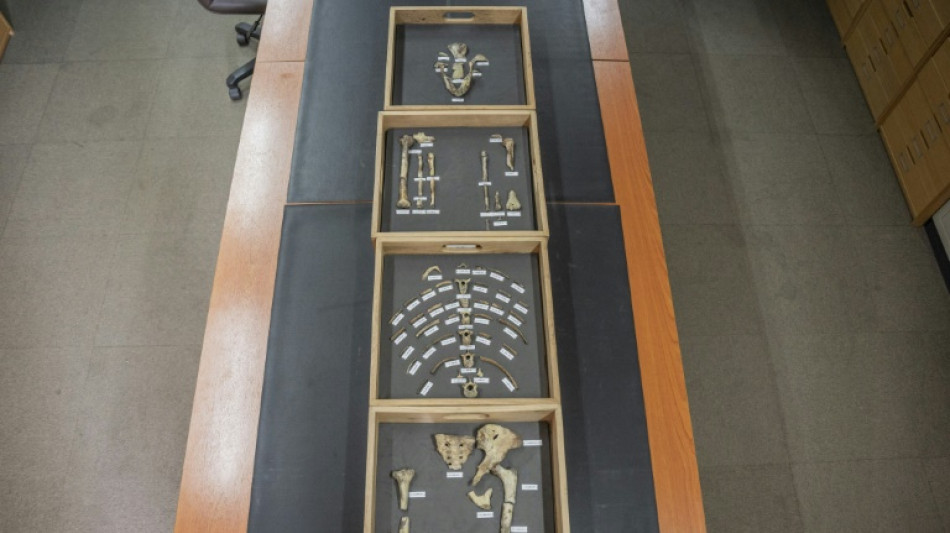
-
 Morocco coach Regragui aims to shift pressure to Cameroon before AFCON clash
Morocco coach Regragui aims to shift pressure to Cameroon before AFCON clash
-
HRW warns right to protest 'under attack' in UK

-
 French farmers rage against EU-Mercosur trade deal
French farmers rage against EU-Mercosur trade deal
-
Humanoid robots go for knockout in high-tech Vegas fight night

-
 Brazil's Lula vetoes law reducing Bolsonaro's sentence
Brazil's Lula vetoes law reducing Bolsonaro's sentence
-
Macron accuses US of 'turning away' from allies, breaking rules

-
 Joshua pays tribute to close friends killed in crash
Joshua pays tribute to close friends killed in crash
-
Protesters, US law enforcement clash after immigration officer kills woman

-
 French ex-spy chief cops suspended jail term for 15 mn euro shakedown
French ex-spy chief cops suspended jail term for 15 mn euro shakedown
-
Syria bombs Kurdish areas in city of Aleppo

-
 Confusion reigns over Venezuela's oil industry as US looms
Confusion reigns over Venezuela's oil industry as US looms
-
Stocks retrench as traders eye geopolitics, US jobs data

-
 US trade gap shrinks to smallest since 2009 as imports fall
US trade gap shrinks to smallest since 2009 as imports fall
-
Russia releases French researcher in prisoner exchange

-
 Spain signs agreement with Church to compensate abuse victims
Spain signs agreement with Church to compensate abuse victims
-
Macron accuses US of 'breaking free from international rules'

-
 US could run Venezuela, tap its oil for years, Trump says
US could run Venezuela, tap its oil for years, Trump says
-
England to stick with Stokes and McCullum despite Ashes flop

-
 Nobel laureate Bialiatski tells AFP 'important' to keep pressure on Belarus
Nobel laureate Bialiatski tells AFP 'important' to keep pressure on Belarus
-
Russia slams Western peacekeeping plan for Ukraine

-
 Bordeaux's Du Preez wary of Northampton's Champions Cup revenge mission
Bordeaux's Du Preez wary of Northampton's Champions Cup revenge mission
-
Romero apologises for Spurs slump as crisis deepens

-
 Former Premier League referee Coote gets suspended sentence for indecent image
Former Premier League referee Coote gets suspended sentence for indecent image
-
New clashes hit Iran as opposition urges protests, strikes

-
 Stocks retreat as traders eye geopolitics, US jobs data
Stocks retreat as traders eye geopolitics, US jobs data
-
'Girl with a Pearl Earring' to be shown in Japan, in rare trip abroad

-
 Syria tells civilians to leave Aleppo's Kurdish areas
Syria tells civilians to leave Aleppo's Kurdish areas
-
'Sign of life': defence boom lifts German factory orders

-
 Japan's Fast Retailing raises profit forecast after China growth
Japan's Fast Retailing raises profit forecast after China growth
-
Olympic champion Zheng out of Australian Open

-
 England's Brook 'deeply sorry' for nightclub fracas
England's Brook 'deeply sorry' for nightclub fracas
-
New clashes in Iran as opposition urges more protests

-
 Equity markets mostly down as traders eye US jobs data
Equity markets mostly down as traders eye US jobs data
-
England cricket board launches immediate review into Ashes debacle

-
 Dancing isn't enough: industry pushes for practical robots
Dancing isn't enough: industry pushes for practical robots
-
Asian markets mostly down as traders eye US jobs data

-
 Australia to hold royal commission inquiry into Bondi Beach shooting
Australia to hold royal commission inquiry into Bondi Beach shooting
-
Sabalenka accuses tour chiefs over 'insane' tennis schedule

-
 Cambodia to liquidate bank founded by accused scam boss
Cambodia to liquidate bank founded by accused scam boss
-
Farmers enter Paris on tractors in protest at trade deal

-
 Viral 'Chinese Trump' wins laughs on both sides of Pacific
Viral 'Chinese Trump' wins laughs on both sides of Pacific
-
Stokes vows to stay on but 'wrongs to put right' after crushing Ashes defeat

-
 Lidl to drop broadcast TV ads in France
Lidl to drop broadcast TV ads in France
-
Stokes admits 'wrongs to put right' after crushing Ashes defeat

-
 Sabalenka impresses again in Australian Open warm-up, vows more to come
Sabalenka impresses again in Australian Open warm-up, vows more to come
-
Gilgeous-Alexander to the rescue as Thunder sink Jazz in overtime

-
 From Diaz to 'Mazadona' - five new faces starring at AFCON
From Diaz to 'Mazadona' - five new faces starring at AFCON
-
Startups go public in litmus test for Chinese AI

-
 Death of Bazball: Five things we learned from Ashes series
Death of Bazball: Five things we learned from Ashes series
-
Australia's emotional Khawaja bows out for final time with Ashes win

| SCS | 0.12% | 16.14 | $ | |
| CMSC | -0.07% | 22.985 | $ | |
| BCC | 5.6% | 77.825 | $ | |
| NGG | 0.1% | 79.47 | $ | |
| RIO | -1.48% | 83.64 | $ | |
| BP | -0.54% | 33.49 | $ | |
| BTI | 0.99% | 53.825 | $ | |
| GSK | 0.1% | 50.67 | $ | |
| AZN | -0.19% | 94.98 | $ | |
| RBGPF | -0.27% | 81.57 | $ | |
| RYCEF | 0.29% | 17.05 | $ | |
| JRI | 0.66% | 13.73 | $ | |
| CMSD | 0.04% | 23.61 | $ | |
| BCE | 1.71% | 23.735 | $ | |
| VOD | -1.08% | 13.825 | $ | |
| RELX | 0.62% | 42.445 | $ |

Human ancestor Lucy still has secrets 50 years after discovery
She was, for a while, the oldest known member of the human family. Fifty years after the discovery of Lucy in Ethiopia, the remarkable remains continue to yield theories and questions.
In a non-descript room in the National Museum of Ethiopia, the 3.18-million-year-old bones are delicately removed from a safe and placed on a long table.
They consist of fossilised dental remains, skull fragments, parts of the pelvis and femur that make up the world's most famous Australopithecus afarensis, Lucy.
The hominid was discovered on November 24, 1974, in the Afar region of northeast Ethiopia by a team of scientists led by Maurice Taieb, Yves Coppens, Donald Johanson, Jon Kalb, and Raymonde Bonnefille.
The 52 bone fragments, amounting to some 40 percent of Lucy's skeleton, was, at the time, the most complete ever found, and revolutionised the understanding of our ancestors.
The skeleton was initially called A.L-288-1, in reference to Afar and its geolocation.
But the researchers nicknamed it Lucy after The Beatles' song "Lucy in the Sky with Diamonds", which they listened to after celebrating their discovery.
Lucy walked on two legs and is thought to have died aged between 11 and 13 -- considered an adult for this species. She was 1.10 metres tall (3.6 feet) and weighed 29 kg (64 pounds).
For Sahleselasie Melaku, the 31-year-old head of the palaeontology department, Lucy's discovery represented an emergence from a "dark age" in our understanding of human ancestors.
"The impact of the discovery was very big in the discipline and even the whole world," he told AFP.
Lucy showed that members of the human family existed beyond three million years ago, and she also provided a template for fitting together later bone discoveries.
The amount of information that can be gleaned from the bones has allowed some highly detailed theories about Lucy's life.
A slightly deformed vertebra, for instance, "means she probably had back problems", said Melaku.
- 'Exceptional' -
Jean-Renaud Boisserie, a paleonthologist specialised in Ethiopia and the research director at the French National Centre for Scientific Research said it was an "exceptional" breakthrough for the discipline.
"We basically knew very little about the period of three million years ago, and we had nothing as complete," he said.
Lucy was often described as "the grandmother of humanity", but more recent discoveries suggest she may have been more like an aunt or a cousin, experts say.
Skeletal finds in places like Ethiopia, South Africa and Kenya have complicated the picture and led to much debate about when different species of hominid emerged and which should be classified as part of the human or chimpanzee families.
The discovery of "Toumai" in Chad in 2001 -- a skull dated to six or seven million years old -- suggested the human family may go much further back than previously thought.
Meanwhile, Lucy has yet to reveal all her secrets.
A study published in 2016 argued she spent a third of her time in trees, where she nested, and had highly developed upper limbs.
Another study that year in the American journal Plos One theorised that she died after falling from a tree.
A 2022 study in Nature, focused on Lucy's pelvis, concluded that newborn members of Australopithecus had a very immature brain, like human newborns today, and required parental support to survive.
"There are a lot of unanswered questions," said Melaku with a smile. "Especially, we don't know much more about the early livelihoods of these early human ancestors."
The museum receives frequent requests to study it, but the iconic skeleton no longer leaves Ethiopia.
Wider scientific progress and advanced equipment are opening up new avenues for research.
"The studies that can be carried out on her, on her peers, pose the scientific questions of tomorrow," said Boisserie.
"Material as exceptional as this plays a driving role in the evolution of research."
L.Mason--AMWN



